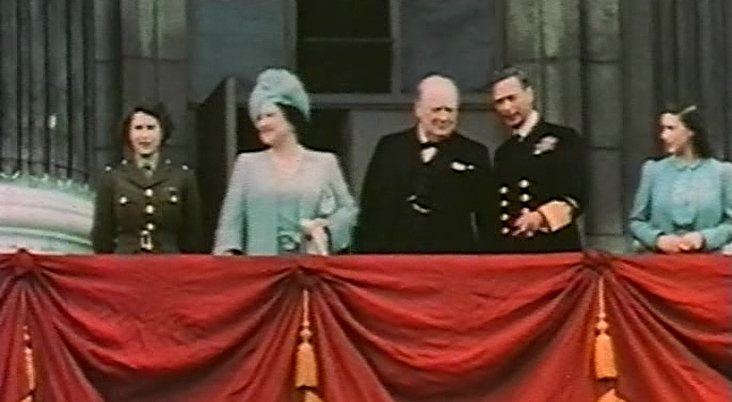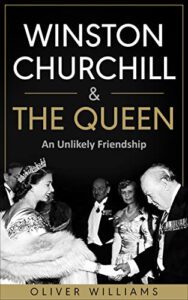
Williams on Her Majesty and Churchill: Get It Right
Excerpted from a review of Winston Churchill & The Queen by Oliver Williams for the Hillsdale College Churchill Project. For the original article with endnotes, click here. To subscribe to weekly articles from Hillsdale-Churchill, click here, scroll to bottom, and fill in your email in the box entitled “Stay in touch with us.” Your email address is not given out and remains a riddle wrapped in a mystery inside an enigma.
The Queen and WSC
Oliver Williams, Winston Churchill & The Queen. Self-published, 2022, 128 pages, paperback $8.99, Kindle $5.99.
A beautiful tribute to Her Majesty The Queen and Winston Churchill—only a click away—is by David Dilks. This book reminded me of it. Not because it is related to what Dr. Dilks wrote, but because it should have been. A good, short appreciation of their relationship, now that the last page has been turned for both, is needed. This paperback leaves us waiting.
 Their closest relationship—during Churchill’s postwar premiership—lasted scarcely three years. Those were years of sad decline for the nation that had held the fort for liberty. We may well agree with the author that it took two sterling characters, Head of State and Head of Government, to cope as well as they did.
Their closest relationship—during Churchill’s postwar premiership—lasted scarcely three years. Those were years of sad decline for the nation that had held the fort for liberty. We may well agree with the author that it took two sterling characters, Head of State and Head of Government, to cope as well as they did.
Mr. Williams appreciates that—as should everyone. Oddly, a back cover blurb declares that “theirs was not an unlikely friendship at all,” contradicting the subtitle. Of course it was not “unlikely.” This is the first of many detours, false trails, red herrings and off-the-wall pronouncements that will mislead the unwary. It is perfectly fine to produce “a light-hearted book…that talks to the reader[s] instead of lecturing them.” But parts of this one sounds like a sparsely researched lecture.
“A great deal of life from afar”
Churchill quoted a line about Arthur Balfour: “He saw a great deal of life from afar.” For her first 25 years, that also applied to the young Princess Elizabeth. Destiny called in 1936, when her uncle abdicated, placing her father on the throne and herself next in line. Elizabeth was but 12 when Munich guaranteed another war. She was 14 when Churchill became prime minister and vowed to fight to the finish.
From then on, devotedly serving her country, Elizabeth Windsor saw life close-up. When she died in 2022, her Rolodex must have included more royalty, heads of state and government, and prominent international figures than any in the world. Broadly mourned, she was the best-known woman on the planet.
As far as we know, Churchill said only one thing about the youthful Elizabeth. That was a note to his wife, from Balmoral, in 1926, when she was two: “This last is a character…. She has an air of authority & reflectiveness astonishing in an infant.” His view was remarkably prescient. Yet years later, when she ascended to the throne, Churchill confessed he knew nothing of her and that she was “only a child.”
None of this is in the book. Churchill’s actual words about The Queen are few. Instead we get a hodgepodge of paraphrase, opinion, strange assertions and misconstrued deductions which sidetrack the story and obfuscate reality.
Cacophony of errors
Here are a few. Churchill sacrificed a soldier’s career to become a politician (2). He missed meeting Hitler in 1932 because he “fell ill and had to move to a sanitorium in Austria” (35). In the 1930s the Royal Family was divided by “those who supported Hitler and those who most certainly did not” (87). George VI was “displeased” when “Atlee [Attlee] skipped into Buckingham Palace” to say he’d won the 1945 election (39). (The King regretted losing Churchill, but he also knew that the people had chosen overwhelmingly. And Clement Attlee didn’t skip.)
It is true that Churchill objected to televising the 1953 Coronation, Mr. Williams writes: “Dare we say it that the three words The Queen and Prince Phillip whispered to one another after the decision was made were ‘interring’ [‘interfering’?], and ‘old’ and ‘busybody’?” (99) Elizabeth II practiced “no smoking” (107). Churchill stuttered (60). Such assertions (unfootnoted) are supported by no evidence whatsoever.
Almost a fourth of the book is spent on preliminaries: Churchill’s view of and relations with British sovereigns, personal and historical. We go back to Queen Anne and his great ancestor Marlborough. Winston himself meets King George V in 1887—Mr. Williams means Prince George, then third in line behind his father and elder brother Albert Victor, who died in 1892. How this meeting matters to Elizabeth II and Winston Churchill is not apparent.
George VI had doubts about his new Prime Minister in May 1940—that much is inarguable. The King remembered the debacle of the Dardanelles “in the dying days of the Great War.” No, it was in the opening days of the Great War. Which Churchill hoped the Dardanelles would help end sooner.
Williams provides…
a number of quotations, but most don’t apply to the subject and are unattributed. The Queen’s quip that she wore bright colors because “I have to be seen to be believed” sounds in character. Her remark to a writer in need of a title, “I can’t think of a reason to give you one,” sounds more doubtful—she was always so nice! The Churchill quotations are a mixed bag. Of the first six (81-82), two are accurate, two are bowdlerized, and two are fiction.
More curious is the assortment of “Churchillisms” (83-84) which “Mr. Langworth has been so kind as to provide us.” I provided none, unless he means my books. They are nicknames, applied in public and private to people WSC encountered: From “Admiral de Row-Back” at the Dardanelles to John Foster “Dull-Duller-Dulles.” Aside from “Wuthering Height” (meant for the BBC’s John Reith, not John Walsham), they’re accurate. But they have nothing to do The Queen and Winston Churchill.
“Monarchical Number One”
Much is made of an unfootnoted statement by Clementine that her husband was “Monarchical Number One.” It may be genuine: she liked to twig him about his monarchical attachment. But this is belabored over several pages, extending to the ravens in the Tower of London. Churchill didn’t care about symbolism, Mr. Williams concludes. He was not “duty bound to slavishly adore the Monarch, flaws and all.”
Particularly misunderstood is Churchill’s long-postponed retirement. Churchill’s “dog in manger” attitude, says Williams, “must have put a strain on the Queen’s tolerant attitude.” Leaving more graciously might have saved her “many sleepless nights” (97). “It wouldn’t be lying to say that Churchill…might have encouraged his wife, Clementine, to whisper into the Queen’s ear about how retirement would break his heart” (101). What?
In fact, The Queen sympathized with Sir Winston’s predicament as advancing age weighed upon him. Why not simply quote her true feelings? No one, she wrote to him, would ever “be able to hold the place of my first Prime Minister, to whom both my husband and I owe so much.” And Churchill’s reply: “I regard it as the most direct mark of God’s favour we have ever received in my long life that the whole structure of our new-formed Commonwealth has been linked and illuminated by a sparkling presence at its summit.”
This illustrated, as David Dilks wrote, what Churchill truly believed: “The monarchy signified for him something of infinite value, at once numinous and luminous. And if you will allow the remark in parenthesis, ladies and gentlemen, do you not sometimes long for someone at the summit of our public life who can think and write at that level?”
Indeed we do.






